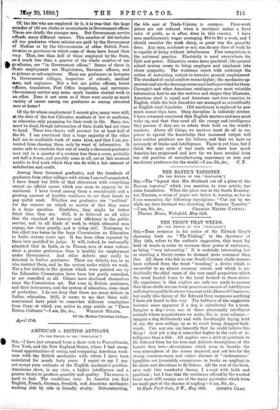AMERICAN v. BRITISH ARTISANS.
[TO THE EDITOR OF THE "SPECTATOR."]
Sin,—I have just returned from a short visit to Pennsylvania, New York, and the New England States, where I had excep- tional opportunities of seeing and comparing American work- men with the British mechanics with whom I have been associated for nearly forty years. I regret to say I can- not accept your estimate of the English mechanic's position. Americans show, in my view, a higher intelligence and a greater desire to produce quantity and quality. The reason is hard to find. The conditions 'vary. In America you find English, French, German, Swedish, and American mechanics working side by side in friendly rivalry. Subcontracting, the bête now of Trade-Unions, is common. Piece-work prices are not reduced when a mechanic makes a fixed ratio of profit, as is often done in this country. I have seen machinemen's wages averaging 319 to $21 a week, and I should consider the work cheap, so great was the quantity done. Any man, mechanic or not, can do any class of work he is capable of doing without interference. Free competition is the universal practice. Electricity is used everywhere for light and power. Education seems more practical ; the general school system seems to bring employer and employed into closer sympathy. The workmen reject with contempt the notion of restricting output to increase general employment. The standard of social comfort seems higher; the mechanics ap- preciate and use the dressing-rooms and baths provided for them. Carnegie's and other American catalogues give most valuable information how to use the sections and shapes they illustrate. American steel is equal, and American cast-iron superior, to English, while the best foundries are managed as scientifically as English steel foundries. Old machinery is replaced by new much sooner than here. Shop discipline is infinitely stricter. I have returned convinced that English masters and men must wake up, and that they need all the energy and intelligence they possess if they are to retain their hold on the world's markets. Above all things, we masters must do all in out power to spread the knowledge that increased output will hurt neither producer nor his fellows, and that we have no monopoly of brains and intelligence. There is yet time, but I think the next cycle of bad trade will show how much America has progressed and how far we have receded from our old position of manufacturing supremacy as iron and machinery producers for the world.—I am, Sir, &c., C. E.






































 Previous page
Previous page